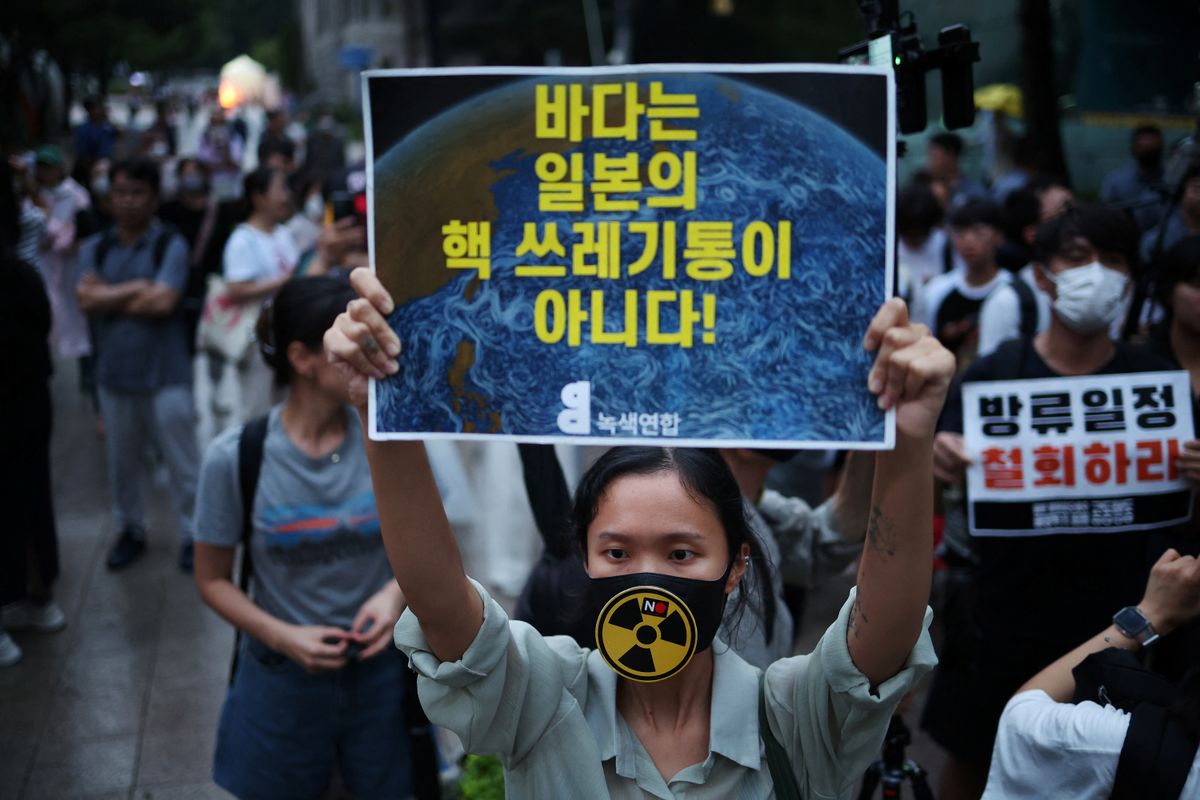Japan will begin releasing treated Fukushima nuclear wastewater on August 24
Japanese officials announced on Tuesday that the country would begin releasing Fukushima nuclear wastewater into the ocean as soon as Thursday.

A few minutes every morning is all you need.
Stay up to date on the world's Headlines and Human Stories. It's fun, it's factual, it's fluff-free.
The backstory: After Japan’s earthquake and tsunami back in 2011, three reactors at the Fukushima nuclear power plant went into meltdown. The country has been pumping seawater in to cool the melted fuel, but that creates a lot of nuclear wastewater. Since then, this radioactive wastewater has been stored in the facility, but space is running out, and it needs to go somewhere else so the damaged plant can be safely decommissioned.
In 2021, Japan announced an approved plan to release the radioactive wastewater into the Pacific Ocean, about a kilometer off the coast, over the span of 30 years. The water would still be slightly radioactive, but it would be treated and diluted so the contamination levels would be safe, according to experts.
Neighboring countries have worried about this plan and how it might affect the oceans and their ecosystems. But the International Atomic Energy Agency (IAEA) did a safety review and found it would have a “negligible” impact on people and the environment. Even so, nearby countries have threatened to curb or ban Japanese seafood if it goes ahead, and many communities have publicly demonstrated against this wastewater disposal.
More recently: In June, South Korean media reported that shoppers had started buying in bulk and hoarding sea-based staples like sea salt, seaweed and anchovies over worries about the pending wastewater release. Sea salt prices soared over 40%, and the government had to start releasing salt from its reserves to stabilize the market.
On Sunday, Japan’s Prime Minister Fumio Kishida visited the Fukushima nuclear plant and said he had plans to talk directly with fishermen’s organizations to address their concerns. He also said the decision on when the release would begin would be made Tuesday once final safety checks had been done and promised to support the fishing community over any reputational damage they might face in response to the release.
The development: Japanese officials announced on Tuesday that the country would begin releasing the wastewater into the ocean as soon as Thursday, weather permitting.
Also on Tuesday, Chinese foreign ministry spokesperson Wang Wenbin said Beijing would take “necessary measures” to protect food safety and the public while still urging Japan to reconsider its decision. Meanwhile, South Korea said that, while it doesn’t necessarily support the plan, it sees no problems with its scientific or technical aspects.
In Hong Kong, the government expressed “strong opposition” to the plan, also saying it would put indefinite bans on Japanese seafood imports from 10 prefectures and also perform and publish daily tests on other food imports from the country starting Thursday. The ban will apply to Tokyo, Fukushima, Chiba, Tochigi, Ibaraki, Gunma, Miyagi, Niigata, Nagano and Saitama, and it’ll include all fresh, frozen, chilled, dried or processed seafood, as well as sea salt and seaweed. Macau is also implementing the ban.
Key comments:
“The government will take responsibility until the disposal of ALPS-treated water is completed, even if it takes several decades,” said Japanese Prime Minister Fumio Kishida.
"We have assessed that there are no scientific or technical problems with the plan to release the contaminated water," said a statement from the South Korean government following the announcement. "But we want to make clear that our government does not necessarily agree with or support the plan to release contaminated water.”
“Japan should stop the plan to release the water into the sea, but seriously consult with the international community and consider a scientific, safe, transparent and convincing response,” said Wu Jianghao, China’s ambassador to Japan, in a news conference in early July.
A US State Department spokesperson said in a statement that Japan has been “transparent about its decision and appears to have adopted an approach in accordance with globally accepted nuclear safety standards.”
“We are taking a more conservative and safer approach … to assure Hongkongers that all Japanese imports are safe, and we can consume them with peace of mind,” said Secretary for Environment and Ecology Tse Chin-wan about the seafood import ban.
“I started my career in the sea and I’ve been doing this work for 30 years,” he said. “I don’t have any other skills … I’ve lived my entire life catching fish so I can’t try doing anything else,” said Lee Gi-sam, a fisherman in the port city Tongyeong, to CNN.




Comments ()